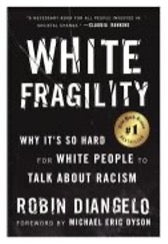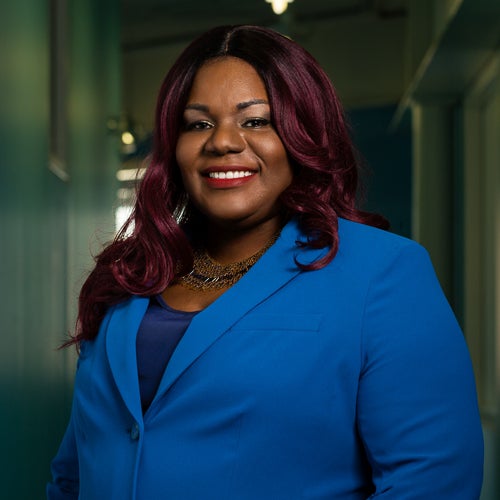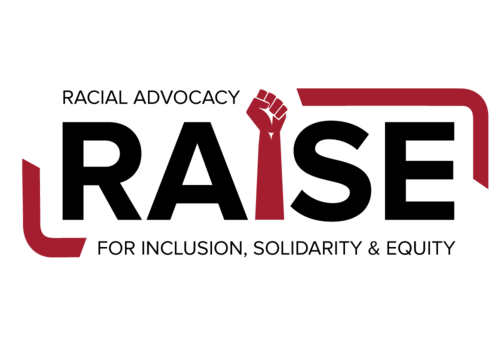
Welcome back to our fourth issue of The Catalyst Anti-Racism Newsletter.
Each month, we have a different President’s Anti-Racism Taskforce (PART) working group co-chair introduce the newsletter. We hope this will give you a deeper understanding of the dedicated people behind our work.
This month, our message comes from Naima Samuel, graduate student, School of Environment, Enterprise, and Development and co-chair of the Educational Environment and the Development of Learners working group.
In this issue:
- Message from the Chair
- Anti-racism across campus
- Staff feature
- Department feature
- Working group update
- Past events
Message from the Chair
 Naima Samuel, graduate student, School of Environment, Enterprise, and Development and co-chair of the Educational Environment and the Development of Learners working group
Naima Samuel, graduate student, School of Environment, Enterprise, and Development and co-chair of the Educational Environment and the Development of Learners working group

The work of the Educational Environment and the Development of Learners (EEDL) working group has been heavily focused on decolonizing the curriculum, teaching, and research. Through our recommendations we hope to dismantle power structures and confront colonizing practices that have influenced education in the past and today, to ensure we can create a more inclusive learning environment, where Black, Indigenous, and other racialized peoples are valued, empowered, represented, and safe.
I would like to acknowledge that August is a special month for Black, Indigenous, and other racialized groups. August 9 is the International Day of the World’s Indigenous Peoples, August 23 is the International Day for the Remembrance of the Slave Trade and Its Abolition and August 31 is the International Day for People of African Descent. These days are not only important for both celebrating Black and Indigenous peoples, but for acknowledging and remembering the centuries of injustices endured by them and other peoples. The work we do in EEDL is also meant to reflect and celebrate Indigenous ways and Black ways of knowing and sharing knowledge in both teaching and learning.
It's important to recognize that while celebrating internationally observed days is paramount, we should strive to create a culture at the University of Waterloo where Black, Indigenous, and other racialized peoples are celebrated every day. This should be reflected in the work we do to create a thriving learning environment, the daily conversations we have, the knowledge we produce, and the relationships we build.
Finally, it is my hope that the University of Waterloo will continue to increase investments into resources and financial supports to advance anti-racism efforts, which ensure that those most passionate about the work are not left feeling overwhelmed or unsupported.

THE CATALYST
Subscribe now to receive each issue of this newsletter direct to your inbox
Anti-racism across campus
 Maawanji-idiwag (They come together): Institutional Approaches to Decolonizing Curricula
Maawanji-idiwag (They come together): Institutional Approaches to Decolonizing Curricula

Decolonizing curricula is an important aspect of both decolonization and reconciliation, as institutions of learning consider whose knowledge and ways of knowing are given priority. Maawanji-idiwag (They come together): Institutional Approaches to Decolonizing Curricula, scheduled for September 23, 2021, from 1:00pm to 2:30pm, is a virtual discussion that will bring together a panel of academics and practitioners, who are not just experienced in theoretical decolonization, but who have taken concrete steps and actions to decolonize curricula in their respective institutions.
Panelists, Sheila Cote-Meek, vice-president, Equity, People and Culture (York University), George J.S. Dei, professor and chair, Department of Sociology and Equity Studies, Ontario Institute for Studies in Education (University of Toronto), and Stryker Calvez, manager, Indigenous Education Initiatives (University of Saskatchewan), will discuss opportunities and challenges for institutional approaches and practices to decolonize curricula. Educational Environment and the Development of Learners working group members, Professor Kim Nguyen will moderate the discussion, while Jaydum Hunt, director, Waterloo Indigenous Student Centre will introduce the speakers.
This discussion will be valuable to any member of the UWaterloo campus community interested in exploring practical examples of implementing practices, programs, and policies to decolonize curricula in educational institutions. Department chairs and faculty administrators will be particularly interested in thinking about their curricula composition and course design practices. Faculty members and instructors with teaching responsibilities may also be interested in learning from the experience of these panelists in advocating for decolonized curricula. Students will also benefit from this discussion as it impacts their learning and prompts questions and reflection on how knowledge is prioritized or left out.
"Following the conclusion of the Truth and Reconciliation Commission in 2015, we have seen an increase in calls to decolonize post-secondary institutions, academic disciplines, teaching practices and pedagogies, and research ecosystems," said Sara Anderson, manager, Research Program Development and Partnerships, Indigenous Initiatives and member of the Educational Environment and the Development of Learners working group.
"We hope that this event will spark meaningful dialogue and action to undertake and properly resource processes to examine and decolonize program curricula," she added.
This panel discussion is one of several monthly events organized by the President’s Anti-Racism Taskforce (PART). The event also aligns with the mandate of the Educational Environment and the Development of Learners working group, which has been tasked with developing recommendations for decolonizing curricula and teaching practices at Waterloo.
Register for Maawanji-idiwag (They come together): Institutional Approaches to Decolonizing Curricula here.

The Anti-racism book club is an ongoing PART initiative, which helps to promote education, awareness, and a deeper understanding of race, culture, and ethnicity across campus. Since July 2021, each month a significant cross-section of the campus community has engaged in discussions about race and racism and practical solutions to confront and dismantle institutionalized racism.
In September, Professor Frankie Condon, who has conducted extensive research in anti-racism rhetoric and anti-racism pedagogy, will lead the discussion of Robin DiAngelo’s, White Fragility (2018), the New York Times bestseller that gained international prominence in theaftermath of the murder of George Floyd in the US.
“The book is both important and flawed,” said Professor Condon. “Robin DiAngelo, a long-time diversity educator, draws on her experience delivering diversity training to white folks, who respond defensively to systemic, institutional, and individual analyses of racism, white privilege, and white supremacy. White Fragility has been both lauded for its acknowledgment of White performances of fragility, long observed by anti-racist activists and educators, and criticized for its over-determination of White racialization and representation of powerlessness among Black, Indigenous, and Peoples of Colour.”
What can participants expect from the third book club? Professor Condon believes the book, and its flaws, pose a powerful challenge, which, she says includes understanding roles and responsibilities (individual and collective) for acknowledging historical racism and white supremacy and becoming accountable to Black, Indigenous, and Peoples of Colour for anti-racism without expecting or insisting that they teach us how to be right.
“DiAngelo is responding to a challenge by BIPOC anti-racist activists for White anti-racists to take on the work of educating other Whites so that BIPOC activists won’t have to,” the professor explained. “Of course, taking up such a challenge is fraught with the risk of both learningful and catastrophic failures. As problematic as DiAngelo’s book may be, we cannot learn from her wisdom or her mistakes without reading and talking about them,” she concluded.
Professor Condon hopes that participants attending the book club discussion will come not only for affirmation of their convictions and commitments, but also for robust and difficult dialogue about the roles and responsibilities of White folks in anti-racism efforts. She anticipates advancing community and solidarity that will extend well beyond the conversation and be carried forward into the ongoing collective anti-racism work at the University of Waterloo.
Register for the September Anti-racism book club here.
Staff feature

In her new role as Anti-racism communications manager, Tracelyn Cornelius supports strategic communications for ongoing anti-racism initiatives undertaken by the President’s Anti-racism Taskforce (PART). She also applies anti-oppression, anti-racism, and decolonizing lenses to provide guidance to senior leaders on communications related to tackling systemic racism at the University of Waterloo.
No stranger to anti-racism work at UWaterloo, Ms. Cornelius has been involved in planning and coordinating PART’s activities, for the last nine months, in her previous role as the international communications specialist at Waterloo International, where the majority of her workload had been dedicated to supporting the Executive Planning Committee, working closely with the President's executive-designate for PART, Charmaine Dean, vice-president Research and International.
Tracelyn Cornelius has more than 20 years of experience working in strategic communications, journalism, and education. Before joining Waterloo International in 2019, she worked as a communications officer for a First Nations school board, where she was instrumental in developing and implementing communications strategies that effectively challenged oppressive narratives.
She recently completed a Masters of Environment and Business degree in the School of Environment, Enterprise, and Development (SEED). Although the Sustainable Development Goals (SDGs) formally recognize equality as a fundamental component of sustainability, social justice issues are an underrepresented area of research within this discipline. In an attempt to address this shortfall, Tracelyn focused her capstone project on examining the intersection of anti-racism and Sustainable Development. She looks forward to pursuing a part-time PhD in Sustainability Management, starting in FALL 2021, where she plans to research connecting sustainability management theory to anti-racism, equity, diversity, and inclusion implementation.
“Anti-racism involves actively changing attitudes, beliefs, practices, and policies to confront and dismantle systemic and oppressive hierarchies,” she said. “Anti-racism communications, therefore, focuses on ensuring that multimedia, publications, digital communications, etc., do not perpetuate racism through messaging that reinforces a dominant culture, words or images that reinforce stereotypes, or language that trivializes the experiences of racialized groups.”
“I’m passionate about anti-racism,” Tracelyn continued. "It’s an honour to be working with amazing people, who are committed to confronting and eliminating racism, in all its forms.”
She looks forward to working along with the University of Waterloo to create a positive impact, as the institution continues to take specific and directed action towards dismantling racism.
Department feature

In addition to its anti-racism advocacy work, RAISE also prioritizes providing safe spaces for racialized students to affirm their lived experiences and offering peer-to-peer support. The organization nurtures solidarity between racialized students and builds a greater understanding of the ways communities have been harmed or impacted by oppressive systems.
“Although RAISE has only been in existence for under three years,” said Celine Isimbi, RAISE coordinator, "we have changed the performative narrative around equity, diversity, and inclusion, and what solidarity means and looks like beyond all colonial borders. RAISE made this possible using its three pillars: community building and learning, education/advocacy, and peer-to-peer support, as we worked together with our community and mentors.”
RAISE’s governance structure has two coordinators, an executive, and a volunteer team, who are all trained in peer support at the start of every term. The organization is always open to building external connections with the community, and collaborations are always highly welcomed.
“We provide confidential peer support for the racialized undergraduate student community,” said Hayat Abdurhim, another RAISE coordinator. “Peer support is provided by a trained team of RAISE members. This service is student-centered and supported. It affirms the lived experiences of racialized students through intersectional and anti-oppressive lenses.”
RAISE will be relaunching its mentorship program in the Fall of 2021. This program will offer academic and interpersonal support to first and second-year racialized students, by connecting them with an upper-year BIPOC student. The organization also holds confidential peer-support hours with trained RAISE volunteers.
RAISE also hopes to build on the success of the Xchanges 2021: Beyond Borders, an annual conference, which focuses on addressing racial discrimination and creating a more equitable and inclusive world for racialized peoples. RAISE has already commenced planning for Xchanges 2022.
To book an appointment for RAISE's peer-to-peer support, please visit the WUSA Peer Support page.
Working group update
 From Cindy Yeung, GSA representative
From Cindy Yeung, GSA representative

Cindy Yeung is the Graduate Student Association (GSA) representative on the Professional and Academic Development and Mentorship (PADM) working group. The overarching goal of this working group is to develop recommendations to address professional and academic development and mentorship for Black, Indigenous, and other racialized peoples within the campus community.
As the GSA's vice-president of Administration, focusing on international students, student wellness, data analysis, and policy, Cindy Yeung, a PhD student in the School of Pharmacy, brings a wealth of knowledge and experience to the PADM working group.
"Whether it's ensuring that the Housing and COVID-19 impact surveys distributed by the GSA included questions about equity-related issues," she explained, "or presenting at the Student Mental Health Research conference about the intersection of graduate student wellness and equity, I am happy to apply my knowledge and experiences to advocate for graduate students on the PADM working group."
One of the primary responsibilities of this working group is creating recommendations to increase mentorship and sponsorship opportunities for racialized students, faculty, and staff. Ms. Yeung ensures that graduate student perspectives are kept on the front burner. The GSA has created several pathways of engagement for racialized graduate students, which aids the organization in better understanding student experiences and needs. She also safeguards that lessons learned from these activities are not only communicated to PADM but are incorporated into the approaches used to address each of the working group's five responsibilities.
"What is important to me is supporting the ideas and voices of our graduate students," she said. "For instance," she explained, "voicing concerns that graduate students have about dealing with racism in their career progression, has led PADM to explore recommending a support system for BIPOC faculty to become mentors to racialized graduate students, and strategies to confront racism in the workplace, among several other recommendations."
The GSA representative also ensures that PADM is apprised of ongoing anti-racism initiatives, being carried out by the Graduate Student Association. Such initiatives include the creation of the BIPOC Graduate Student Community Collective and establishing partnerships with undergraduate student groups, faculty, and alumni to develop pathways for students to receive mentorship and support from these groups.
PADM is in the process of carrying out consultations with various stakeholders on campus to inform its recommendations, with the hope of understanding what programs currently exist. The working group is also reviewing how other institutions operationalize professional development and mentorship for racialized groups to establish best practices and lessons learned to reinforce recommendations.
Cindy Yeung is hopeful that the momentum created by PART continues and that racialized student voices continue to be heard, acknowledged, and incorporated into anti-racism initiatives at the university, to ensure that students benefit from equitable opportunities throughout their academic life, and beyond.
Past events

Read more about this event here.